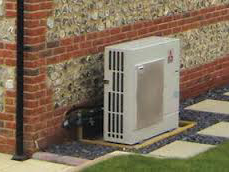Renewable Energy
Renewable technology has come on in leaps and bounds in the past few years and major advances and developments have been made. Gas is no longer your ONLY option to heat your home and hot water. You can now utilize the power of the sun, the natural heat from the ground, and even the air around you.
With the rising cost of gas and electricity many people struggle to heat their homes and hot water without their bank balance taking a considerable blow. We live in a time now where everybody is starting to be environmentally and energy conscious. Renewable energy must be considered if you want to save money on your energy bills and at the same time, do your bit for the environment!
Solar +
 In the UK there is a misconception that many people think that we do not have enough sun to make solar systems work. In fact in some parts of UK we have annual solar radiation levels equal to 60% of those experienced at the equator.
In the UK there is a misconception that many people think that we do not have enough sun to make solar systems work. In fact in some parts of UK we have annual solar radiation levels equal to 60% of those experienced at the equator.
Solar is mainly used in the UK to heat your hot water as this is the most cost efficient way to use this kind of technology. In the summer a solar panel can provide you with up to a 100% of your hot water demand. And although there is limited sun in the winter, systems will still contribute an average of 16-18%.
Solar can be used to power your central heating system however due to the mismatch between availability of solar radiation and the demand for heat, i.e. there is least solar energy available during the winter months in which heating is required it is not recommended. This type of system can be fitted but it means that you will require a larger surface area of collectors to contribute to your heating demand to make it worth your while. This can however make it quite expensive to install.
It is also estimated that up to 75% of outdoor swimming pools could greatly benefit from solar water heating and high system efficiencies can be obtained.
Solar can be fitted to a wide range of existing heating and hot water systems without the need to replace your boiler.
Air Source +
 Air source is one of the latest renewable technologies to be developed and is ideal for properties that aren’t on the national grid (not mains natural gas fed) An air source heat pump can provide you with central heating and hot water all year around regardless of the weather and without the need for and auxiliary heat source (i.e. a back up boiler).
Air source is one of the latest renewable technologies to be developed and is ideal for properties that aren’t on the national grid (not mains natural gas fed) An air source heat pump can provide you with central heating and hot water all year around regardless of the weather and without the need for and auxiliary heat source (i.e. a back up boiler).
An air source heat pump is basically an air conditioning unit working the opposite way around. It draws heat energy from the outside air, through a heat exchanger and converts it into energy to heat your central heating and hot water.
This type of renewable technology is a more expensive option to install rather than your typical LPG or Oil system. However you would see a return in your investment in as little as 4 to 5 years. You would then see a huge saving in your energy expenses.
Air source heat pumps typically achieve a COP (coificiance of performance) of 2.5 to 3.5 where as your typical up to date Combi boiler would only reach a maximum COP of 0.93. These figures are based on an average outside air temperature of 5-10 degrees. With an outside air temperature of 15 degrees a COP of 5.0 is easily achievable.
All heat pumps have integrated weather compensation (economical operation) systems which increase there efficiency for example, typically at an outdoor temperature of -3 degrees a heating flow of 45 degrees would be targeted, whereas a 15 degree outdoor temperature a flow temperature of 30 degrees would be targeted. The lower the flow temperature the more efficient the system will be.
Air source heat pumps are also highly recommended to heat swimming pools.
Air source heat pumps do not incur any civil ground works cost for the installation and laying of pipe work. The cost of civil ground works can be significant using alternative ground source systems. This is not a consideration that is required for Air Source Heat Pumps. This makes this option a significant advantage over Ground Source versions.
Ground Source +
 Ground source heat pumps are another form of renewable technology and are becoming evermore widely used in the UK.
Ground source heat pumps are another form of renewable technology and are becoming evermore widely used in the UK.
Ground source utilises heat energy via a mixture of water and anti freeze from the ground around you home via “Slinkies” (weaving pipe work burred underground) or through deep geothermal bore holes typically 50 – 100m deep drilled with specialist machinery. This heat then passes though a heat exchanger converting it into usable energy to power your central heating and hot water system.
The amount of heat that can be extracted per meter of borehole varies from 20W/m to 70W/m. As with all installations of ground source heat pumps, design of the ground collector is critical to the long-term efficiency of the final installation.
The advantage of a Ground source heat pump over air source is that higher efficiencies are obtainable, the disadvantage however is the heat recovery time and the initial ground work costs.
While Ground Source Heat Pumps are slightly more expensive than conventional heating systems, the benefits far outweigh the costs.
Never thought about renewable energy before?
A Renewable heating solution is great for the environment and could be perfect for you and your home. Please give us a call or complete our online enquiry form and we would be happy to discuss your options and any questions you may have.







 In the UK there is a misconception that many people think that we do not have enough sun to make solar systems work. In fact in some parts of UK we have annual solar radiation levels equal to 60% of those experienced at the equator.
In the UK there is a misconception that many people think that we do not have enough sun to make solar systems work. In fact in some parts of UK we have annual solar radiation levels equal to 60% of those experienced at the equator. Air source is one of the latest renewable technologies to be developed and is ideal for properties that aren’t on the national grid (not mains natural gas fed) An air source heat pump can provide you with central heating and hot water all year around regardless of the weather and without the need for and auxiliary heat source (i.e. a back up boiler).
Air source is one of the latest renewable technologies to be developed and is ideal for properties that aren’t on the national grid (not mains natural gas fed) An air source heat pump can provide you with central heating and hot water all year around regardless of the weather and without the need for and auxiliary heat source (i.e. a back up boiler). Ground source heat pumps are another form of renewable technology and are becoming evermore widely used in the UK.
Ground source heat pumps are another form of renewable technology and are becoming evermore widely used in the UK.

